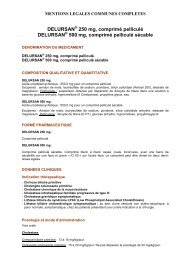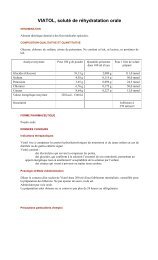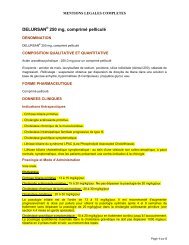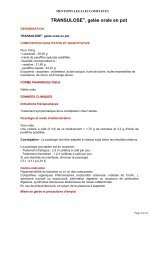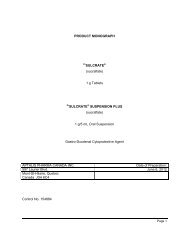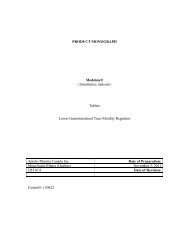bentyl - Aptalis
bentyl - Aptalis
bentyl - Aptalis
Create successful ePaper yourself
Turn your PDF publications into a flip-book with our unique Google optimized e-Paper software.
5.10 Geriatric Population<br />
Dicyclomine hydrochloride should be used with caution in<br />
elderly who may be more susceptible to its adverse effects.<br />
6 ADVERSE REACTIONS<br />
The pattern of adverse effects seen with dicylomine is mostly<br />
related to its pharmacological actions at muscarinic receptors [see<br />
Clinical Pharmacology (12)]. They are a consequence of the<br />
inhibitory effect on muscarinic receptors within the autonomic<br />
nervous system. These effects are dose-related and are usually<br />
reversible when treatment is discontinued.<br />
The most serious adverse reactions reported with dicyclomine<br />
hydrochloride include cardiovascular and central nervous system<br />
symptoms [see Warnings and Precautions (5.2, 5.3)].<br />
6.1 Clinical Trials Experience<br />
Because clinical trials are conducted under widely varying<br />
conditions, adverse reaction rates observed in the clinical trials of a<br />
drug cannot be directly compared to rates in the clinical trials of<br />
another drug and may not reflect the rates observed in practice.<br />
The data described below reflect exposure in controlled<br />
clinical trials involving over 100 patients treated for functional<br />
bowel/irritable bowel syndrome with dicyclomine hydrochloride at<br />
initial doses of 160 mg daily (40 mg four times a day)<br />
In these trials most of the side effects were typically<br />
anticholinergic in nature and were reported by 61% of the patients.<br />
Table 1 presents adverse reactions (MedDRA 13.0 preferred terms) by<br />
decreasing order of frequency in a side-by-side comparison with<br />
placebo.<br />
Table 1: Adverse reactions experienced in controlled clinical<br />
trials with decreasing order of frequency<br />
MedDRA<br />
Preferred Term<br />
Dicyclomine Hydrochloride<br />
(40 mg four times a day)<br />
%<br />
Placebo<br />
%<br />
Dry Mouth 33 5<br />
Dizziness 40 5<br />
Vision blurred 27 2<br />
Nausea 14 6<br />
Somnolence 9 1<br />
Asthenia 7 1<br />
Nervousness 6 2<br />
Nine percent (9%) of patients were discontinued from<br />
BENTYL because of one or more of these side effects (compared<br />
with 2% in the placebo group). In 41% of the patients with side<br />
effects, side effects disappeared or were tolerated at the 160 mg daily<br />
dose without reduction. A dose reduction from 160 mg daily to an<br />
average daily dose of 90 mg was required in 46% of the patients with<br />
side effects who then continued to experience a favorable clinical<br />
response; their side effects either disappeared or were tolerated.<br />
6.2 Postmarketing Experience<br />
The following adverse reactions, presented by system organ<br />
class in alphabetical order, have been identified during post approval<br />
use of BENTYL. Because these reactions are reported voluntarily<br />
from a population of uncertain size, it is not always possible to<br />
reliably estimate their frequency or establish a causal relationship to<br />
drug exposure.<br />
Cardiac disorders: palpitations, tachyarrhythmias<br />
Eye disorders: cycloplegia, mydriasis, vision blurred<br />
Gastrointestinal disorders: abdominal distension,<br />
abdominal pain, constipation, dry mouth, dyspepsia,<br />
nausea, vomiting<br />
General disorders and administration site conditions:<br />
fatigue, malaise<br />
Immune System Disorders: drug hypersensitivity including<br />
face edema, angioedema, anaphylactic shock<br />
Nervous system disorders: dizziness, headache,<br />
somnolence, syncope<br />
<br />
<br />
<br />
<br />
Psychiatric disorders: As with the other anti-cholinergic<br />
drugs, cases of delirium or symptoms of delirium such as<br />
amnesia (or transient global amnesia), agitation,<br />
confusional state, delusion, disorientation, hallucination<br />
(including visual hallucination) as well as mania, mood<br />
altered and pseudodementia, have been reported with the<br />
use of Dicyclomine. Nervousness and insomnia have also<br />
been reported.<br />
Reproductive system and breast disorders: suppressed<br />
lactation<br />
Respiratory, thoracic and mediastinal disorders:<br />
dyspnoea, nasal congestion<br />
Skin and subcutaneous tissue disorder: dermatitis allergic,<br />
erythema, rash<br />
Cases of thrombosis, thrombophlebitis and injection site reactions<br />
such as local pain, edema, skin color change and even reflex<br />
sympathetic dystrophy syndrome have been reported following<br />
Inadvertent IV injection of BENTYL.<br />
6.3 Adverse Reactions Reported with Similar Drugs with<br />
Anticholinergic/Antispasmodic Action<br />
Gastrointestinal: anorexia<br />
Central Nervous System: tingling, numbness, dyskinesia,<br />
speech disturbance, insomnia<br />
Peripheral Nervous System: With overdosage, a curare-like<br />
action may occur (i.e., neuromuscular blockade leading to muscular<br />
weakness and possible paralysis)<br />
Ophthalmologic: diplopia, increased ocular tension<br />
Dermatologic/Allergic: urticaria, itching, and other dermal<br />
manifestations<br />
Genitourinary: urinary hesitancy, urinary retention in patients<br />
with prostatic hypertrophy<br />
Cardiovascular: hypertension<br />
Respiratory: apnea<br />
Other: decreased sweating, sneezing, throat congestion,<br />
impotence. With the injectable form, there may be temporary<br />
sensation of light-headedness. Some local irritation and focal<br />
coagulation necrosis may occur following the intramuscular injection<br />
of BENTYL.<br />
7 DRUG INTERACTIONS<br />
7.1 Antiglaucoma Agents<br />
Anticholinergics antagonize the effects of antiglaucoma<br />
agents. Anticholinergic drugs in the presence of increased intraocular<br />
pressure may be hazardous when taken concurrently with agents such<br />
as corticosteroids. Use of BENTYL in patients with glaucoma is not<br />
recommended [see Contraindications (4)].<br />
7.2 Other Drugs with Anticholinergic Activity<br />
The following agents may increase certain actions or side<br />
effects of anticholinergic drugs including BENTYL: amantadine,<br />
antiarrhythmic agents of Class I (e.g., quinidine), antihistamines,<br />
antipsychotic agents (e.g., phenothiazines), benzodiazepines, MAO<br />
inhibitors, narcotic analgesics (e.g., meperidine), nitrates and nitrites,<br />
sympathomimetic agents, tricyclic antidepressants, and other drugs<br />
having anticholinergic activity.<br />
7.3 Other Gastrointestinal Motility Drugs<br />
Interaction with other gastrointestinal motility drugs may<br />
antagonize the effects of drugs that alter gastrointestinal motility,<br />
such as metoclopramide.<br />
7.4 Effect of Antacids<br />
Because antacids may interfere with the absorption of<br />
anticholinergic agents including BENTYL, simultaneous use of these<br />
drugs should be avoided.<br />
7.5 Effect on Absorption of Other Drugs<br />
Anticholinergic agents may affect gastrointestinal absorption of<br />
various drugs by affecting on gastrointestinal motility, such as slowly<br />
dissolving dosage forms of digoxin; increased serum digoxin<br />
concentration may result.




